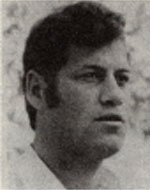Michael (Michi), son of Bronia and Zvi, a Holocaust survivor, was born on 13.7.1946 in Hagens, Sweden, and immigrated to Israel with his family in 1949. He studied at the elementary school in Moshav Bnei Atarot, In the “Western Valley” regional school in Kibbutz Yifat. In his youth, when the family lived in the village of Truman, his father and Rukk fell ill, and Michael was assigned to take care of the livestock, the household, and his younger brothers. His teacher at the time wrote about him: “Despite the difficult conditions, he learned very well and diligently, he was a good student, diligent and disciplined, serious and responsible, always knew to be a good friend and fulfill every job he was asked to do.” After the father recovered, Michael was sent to Kibbutz Yifat. He soon became fond of his new friends, for his sincerity and integrity, his decency and his goodness. He was endowed with will and perseverance, and made sure to complete every task he took upon himself. In every role he played, and in every society he had, in the army and in civilian life, he excelled in dedication, responsibility and precision. He was stubborn, he could stand up for his opinions and fight for his views. He was tall, sturdy, solid, and strong; His entire appearance gave him a sense of authority, seriousness, serenity and paternity. He was very devoted to his family, cared for everyone and did what he could for them, and his parents respected him. Michael was drafted into the IDF in early November 1964 and volunteered for the paratroopers’ paratroop unit, after which he was trained in a paratroopers course and a course for infantry sergeants. In order not to worry his parents, he did not tell them about the arduous training and the difficult field life. During the Six-Day War, he fought in the battles for the conquest of Jerusalem and was part of the unit that sought to break into the Western Wall. The unit was mistaken on its way and on a bridge, opposite the Lions’ Gate, was captured by Jordanian fire and many of its members were injured. After the war he was awarded the “Six Day War”. During the Yom Kippur War he participated in the battles of containment and break-up at the Sinai front. On the night of the crossing of the Suez Canal, Michael fell in battle. After many attempts to conquer the junction, in order to pass through the cylinder bridge, Michael’s battalion was assigned the task of breaking through the Tartar axis from the west and purifying it. A unit of tanks and half-tracks joined the force, and after they crossed the junction, they opened fire, and Michael’s half-track was killed and he was killed on the spot. At first he was considered missing, but his body was later identified and he was brought to eternal rest in the military cemetery in Haifa. He left behind a wife and two daughters, parents and two brothers. After his fall, he was promoted to First Sergeant. His family published a pamphlet in his memory, including things about him, memoirs, letters and photographs; The residents of Kfar Truman erected a monument in his memory.
